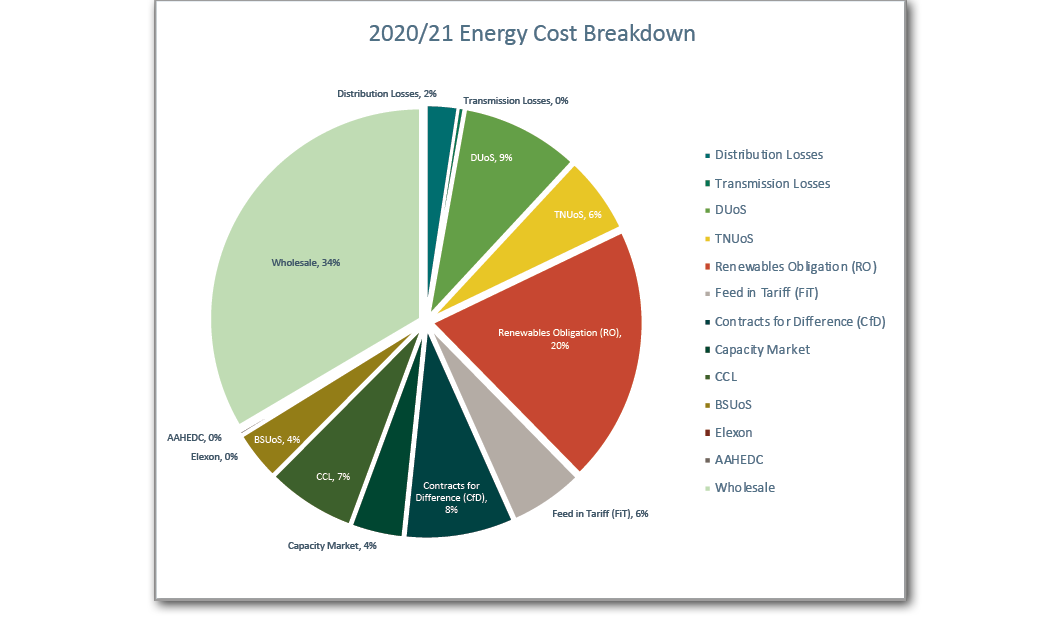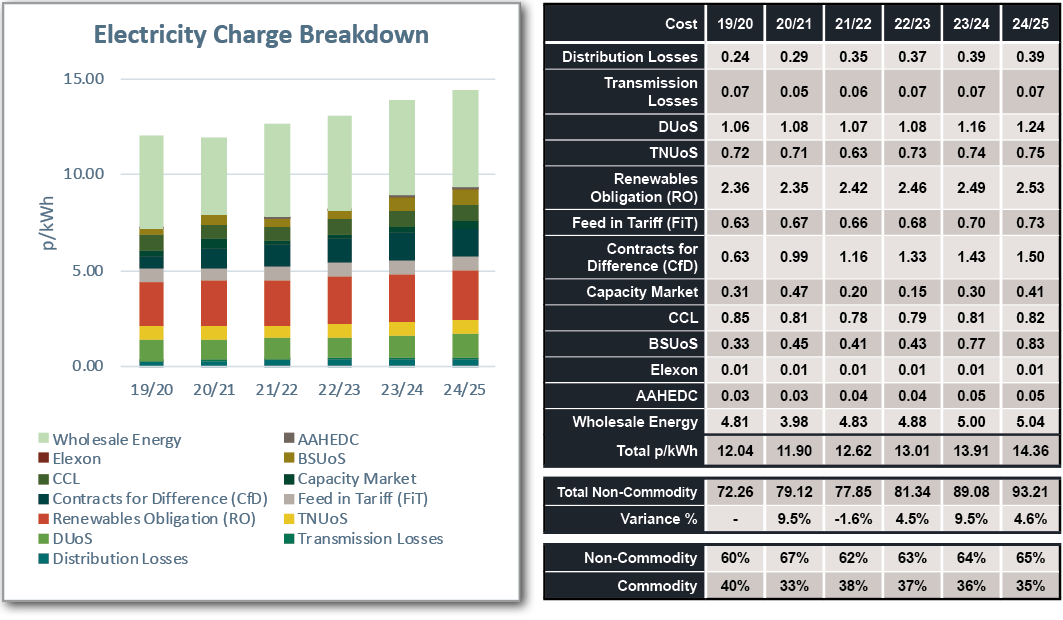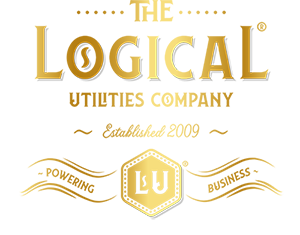News & Blogs from The Logical Utilities Company.




Lorne Giles, Head of Risk Management
The Logical Non-Commodity Report 2020 – What is non-commodity and how does it impact your business’ energy costs?
Non-commodity charges have a significant impact on your business’ commercial energy costs, making up approximately 60% of your total bills, with these charges continually increasing year-on-year. So, what do these charges mean, and what can your business do to alleviate them?
Non-commodity makes up around 60% of your business’ total energy costs, and 40% of your energy budget is made up of the commodity or wholesale energy, so the actual energy itself, depending on the market conditions of when you agreed your energy contracts.
What is non-commodity?
Non-commodity charges comprise of several costs including the cost to transport the energy to your site, energy losses through transportation, network charges, government levies such as CCL, environmental taxes and much more.
The pie chart below shows the wholesale and non-commodity percentage breakdown of energy costs for 2020/21.

Forecasted non-commodity charges
The recent lockdown has had a critical impact on the energy industry, with the most significant being the drop in demand, which drove energy prices downwards.
The dramatic decrease in wholesale prices for the short-term may feel like there ought to be an overall reduction in cost. However, commodity accounts for around a third of the billed rate for electricity and is merely holding back the overall effects of the increases in non-commodity costs. This will rapidly rebound over subsequent years as any benefits are swallowed up and the energy market corrects itself.
The graph and chart below outline future non-commodity increases.

What are the key drivers behind non-commodity increases?
Ofgem sets price controls for the structure of electricity network charges and there will be significant changes to this structure over the coming years, as illustrated in the graph above. These changes could result in large year-on-year changes for many users dependent on their consumption, capacity, and voltages.
Transmission charges:
Transmission charges or TNUoS costs are for transmitting electricity across the country from power stations to the distribution operators. Under current plans, 2021-22 will be the last year in which Triad charges will be exclusively used to recover TNUoS costs.
As of April 2022, this levy will be charged in the form of fixed costs rather than your half hourly (Triad) measurements and will then account for 80% of all TNUoS charging in order to resolve the issue of Triad avoidance programs.
Distribution charges:
Distribution charges or DUoS costs are levies paid to the Distribution Network Operators across the UK for delivering safe and reliable power to the end-user from sub-stations. These are set to change from April 2022 where a fixed charge for each segment will apply for all commercial energy users replacing the current banded charging structure.
Policy:
This covers Renewables Obligations (RO), Capacity Market (CM), Feed-in Tariff (FiT), Contracts for Difference (CfD), and Climate Change Levy (CCL). These charges are to encourage the uptake of renewable generation, security of supply, and discourage excess consumption.
With FiT closing to new applications from 2019, we should start to see a drop-off over the next 5-10 years of this charge as existing redemptions expire. This may balance the uptick in CfD charging as new capacity joins the scheme. Following the reinstatement of CM, the outstanding charges will need to be paid on and where this has not already happened customers can expect extra charging to repay the scheme. As 17 suppliers left the market during its suspension, this could cause a cost smearing across the remaining suppliers’ customers.
Download the full report here.
How can The Logical Utilities Company help your business alleviate non-commodity costs?
Non-commodity costs are set to increase year-on-year reaching up to 65% of your energy bills. Although these costs are increasing there are ways your business can alleviate these charges.
Reviewing your contract and looking at how you could fix in non-commodity costs, while still having the freedom and flexibility to take advantage of wholesale market prices, could be one of the ways your business benefits from financial savings.
The Logical Utilities Company can review your business’ energy contracts on your behalf ensuring you receive the best deals for your company.
Talk with one of our expert advisors to discuss how we could help your business avoid excessive energy bills by calling 0845 113 0125, or email info@logicalutilities.co.uk
We are Pioneers in Utilities Bureau Support Services. Make your next choice Logical.



